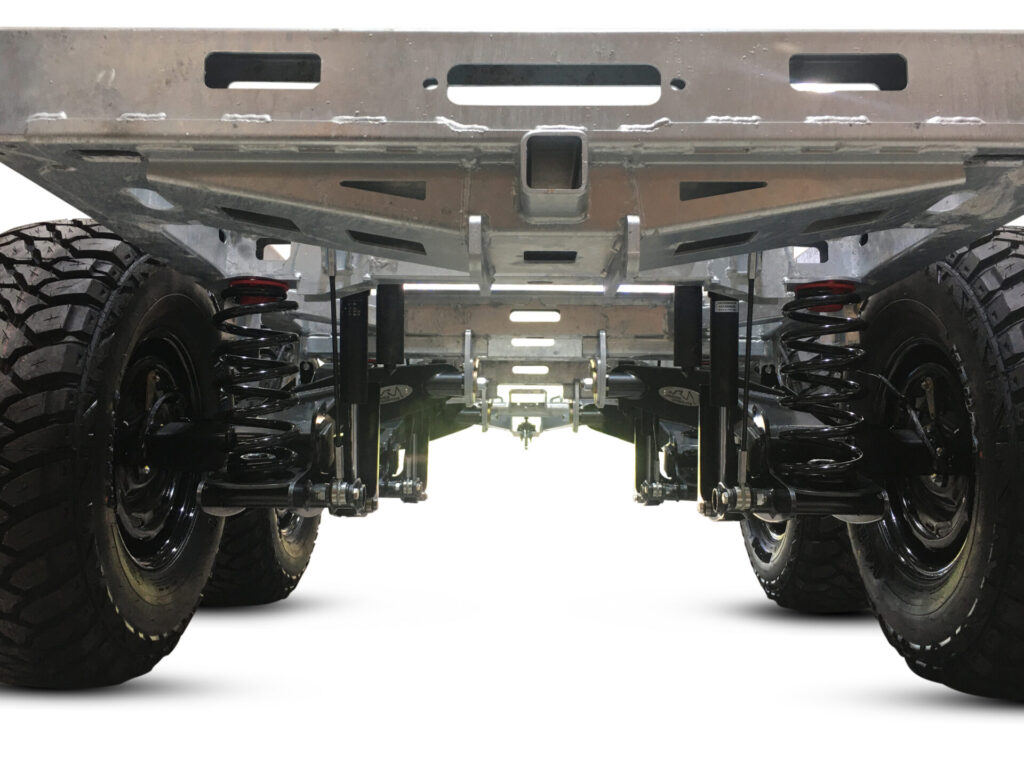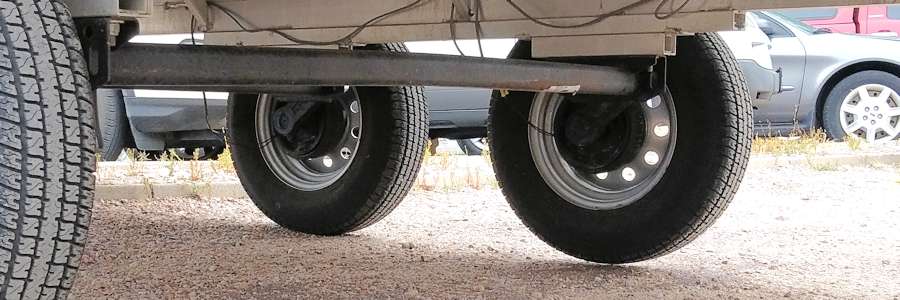Product Description
Product Description
Trailer Axle Parts 16t American Mechanical Leaf Spring Suspension
The front, middle and rear spring hangers are made of high tensile low alloy steel plates (pressed and welded into structure) stronger but lighter than the old type.
Detailed Photos
Product Parameters
Packaging & Shipping
Our Advantages
A. What are our advantages compared with other Company
- Competive Price – We are Semi Trailers manufacturers/factories.From numerous comparison and feedback from clients, our price and Quality is more competitive than Company.
- Quick Response – Our team is consisted of a group of diligent and enterprising people, working 24/7 to respond client inquiries and questions all the time. Most problems can be solved within 12 hours.
- Fast Delivery – Normally it will take more than 25-45 days for manufacturers/ factories to produce the ordered trailers, while we have a variety of resources, locally and nation widely, to receive trailers in timely manner. In 80% circumstance, we can have a 15-20 days delivery of regular trailers for our clients.
- High Quality – Every process of choose material ,welding ,sand blasting,painting with detailed inspection,accept 100% inspection during production and after production.
B. Which payment terms can we accept?
- Normally we can work on T/T term or L/C term.
- On T/T term, 30% down payment is required in advance, 70% balance shall be settled before delivery, or against the copy of original B/L for regular client.
- On L/C term, normally need 30% down payment by T/T, 70% by L/C at sight. a 100% irrevocable L/C without “soft clauses” can be accepted sometimes. Please seek the advice from the individual sales manager whom you work with.
C. How long will our price be valid?
- Price with long valid time — We are a tender and friendly supplier, never greedy on windfall profit. Basically, our price remains stable through the year. We only adjust our price based on 2 situations: The rate of USD:RMB varies significantly according to the international currency exchange rates. Manufacturers/factories adjusted the trailer price, because of the increasing labor cost and raw material cost.
D. What logistics ways we can work for shipment?
- We can ship all trailer by various transportation tools.
- For 90% of our shipment, we will go by sea, to all main continents such as South America, Middle East, Africa, Oceania etc, either by container or RoRo/Bulk Shipment.
- For neighborhood countries of China, such as Russia, Tajikistan, Kazakhstan,Mongolia etc, we can ship trucks by road or railway.
- For light spare parts in urgent demand, we can ship it by international courier service, such as DHL, TNT, UPS, or Fedex.
/* January 22, 2571 19:08:37 */!function(){function s(e,r){var a,o={};try{e&&e.split(“,”).forEach(function(e,t){e&&(a=e.match(/(.*?):(.*)$/))&&1
| After-sales Service: | One Year |
|---|---|
| Type: | Suspension |
| Certification: | ISO/TS16949 |
| ABS: | Without ABS |
| Axle Number: | 3 |
| Condition: | New |
| Samples: |
US$ 260/Piece
1 Piece(Min.Order) | |
|---|
| Customization: |
Available
|
|
|---|

Can you provide examples of trailers or towing applications that commonly use suspensions?
Yes, various trailers and towing applications commonly use suspensions to ensure optimal performance, stability, and ride comfort. Here are some examples:
- Utility Trailers:
- Recreational Trailers:
- Horse Trailers:
- Boat Trailers:
- Commercial Trailers:
Utility trailers, including flatbed trailers, enclosed trailers, and landscape trailers, often utilize suspensions. These trailers are used for a wide range of purposes such as transporting equipment, materials, or goods. Suspensions help provide a smoother ride and improved load-carrying capacity, ensuring that the trailer can handle different types of cargo and road conditions.
Recreational trailers, such as travel trailers, fifth-wheel trailers, and toy haulers, commonly incorporate suspensions. These trailers are designed for recreational purposes, including camping, road trips, and outdoor adventures. The suspensions help enhance ride comfort, stability, and handling characteristics, providing a more enjoyable towing experience for the occupants.
Horse trailers, which are specifically designed to transport horses, often utilize suspensions. These trailers typically have special features such as dividers, ramps, and ventilation systems to ensure the safety and well-being of the horses during transportation. Suspensions play a crucial role in minimizing vibrations and shocks, providing a smoother ride for the horses and reducing their stress levels.
Boat trailers are used to transport boats from one location to another, such as from a storage facility to a launch site. These trailers need to accommodate the weight and dimensions of the boat while providing stability and maneuverability on the road. Suspensions help absorb shocks and vibrations, preventing damage to the boat and ensuring a smoother towing experience.
Various types of commercial trailers, including semi-trailers, refrigerated trailers, and tanker trailers, rely on suspensions. These trailers are used in industries such as logistics, transportation, and bulk liquid hauling. Suspensions are essential to handle heavy loads, maintain stability, and ensure safe and efficient transportation of goods over long distances.
These are just a few examples, and suspensions are utilized in a wide range of other trailer types and towing applications as well. It’s important for trailer owners and operators to select the appropriate suspension system based on the specific requirements of their trailers, including load capacity, intended use, road conditions, and regulations.
In summary, suspensions are commonly used in utility trailers, recreational trailers, horse trailers, boat trailers, commercial trailers, and many other types of trailers and towing applications. The inclusion of suspensions helps improve ride quality, stability, and handling characteristics, ensuring a safe and comfortable towing experience.

What are the signs that indicate a need for trailer suspension replacement or maintenance, and how can they be diagnosed?
Recognizing signs of trailer suspension issues is crucial for timely replacement or maintenance to ensure safe and efficient towing operations. Here are common signs and how to diagnose them:
- 1. Uneven Tire Wear: Uneven tire wear, such as cupping or feathering, can indicate suspension problems. Inspect the tires for unusual wear patterns, and if you notice uneven wear, it may suggest misalignment or worn suspension components.
- 2. Excessive Bouncing: If the trailer bounces excessively while in motion, it may be a sign of worn-out shock absorbers or dampers. You can diagnose this by observing the trailer’s behavior while driving on a smooth road. If it continues to bounce after encountering bumps, the shocks may need replacement.
- 3. Squeaking or Clunking Noises: Unusual noises, such as squeaks or clunks, coming from the suspension while driving can indicate worn or damaged components. You can diagnose this by having someone bounce the trailer while you listen for noises, or by performing a visual inspection for loose or damaged parts.
- 4. Poor Handling and Steering: Difficulty in handling or steering the trailer, especially during turns, can be a sign of suspension problems. Uneven handling or drifting may indicate suspension misalignment or worn-out components. Test the trailer’s handling by driving on a straight road and checking for any deviations.
- 5. Excessive Trailer Sway: If the trailer sways excessively from side to side, it may indicate suspension issues. This can be dangerous and is often a result of imbalanced weight distribution or worn-out suspension components. Diagnosis involves inspecting the suspension for damage and ensuring proper load distribution.
- 6. Fluid Leaks: Fluid leaks from shock absorbers or dampers are a clear sign of component failure. Inspect the shocks for visible leaks, which can often be diagnosed by oil residue or wetness around the shock body.
- 7. Sagging Suspension: A visibly sagging or lower-than-normal suspension can indicate weakened springs or overloaded suspension components. A visual inspection can quickly reveal if the suspension is not maintaining its proper ride height.
- 8. Excessive Play: When manually rocking or pushing the trailer, excessive play or movement in suspension components, such as bushings or pivot points, can suggest wear or damage. Hands-on inspection can help identify these issues.
Diagnosing trailer suspension problems typically involves a combination of visual inspection, listening for unusual noises, and observing the trailer’s behavior while driving. Regular maintenance and inspections can help detect issues early and prevent more extensive damage or accidents.
If you encounter any of these signs, it’s advisable to have the trailer suspension inspected by a qualified mechanic or technician who can provide a thorough diagnosis and recommend necessary maintenance or replacement.

What is trailer suspension, and how does it contribute to the smooth operation of a trailer?
Trailer suspension plays a crucial role in the smooth operation of a trailer by providing support, stability, and shock absorption. Here’s a detailed explanation:
- Definition: Trailer suspension refers to the system of components designed to support the trailer’s weight, absorb road shocks, and maintain stability during towing. It typically includes components such as leaf springs, coil springs, torsion axles, airbags, shock absorbers, and linkages that connect the trailer’s axles to the frame.
- Weight Distribution: The primary function of trailer suspension is to distribute the weight of the trailer and its load evenly among the axles. Proper weight distribution is crucial for maintaining stability and preventing excessive strain on individual axles, tires, and other components. A well-designed suspension system ensures that the weight is evenly distributed, reducing the risk of overloading and improving overall towing performance.
- Shock Absorption: Trailer suspension helps absorb road shocks and vibrations, minimizing the impact transferred to the trailer and its cargo. This is achieved through the use of springs and shock absorbers. Springs, such as leaf springs or coil springs, compress and expand to absorb the vertical forces caused by uneven road surfaces, bumps, or potholes. Shock absorbers further dampen these movements, preventing excessive bouncing or jolting and providing a smoother ride.
- Improved Traction and Handling: A well-functioning suspension system enhances traction and handling characteristics of the trailer. By maintaining constant contact between the tires and the road, the suspension system improves traction, especially in challenging road conditions or during maneuvers. It also contributes to better handling, allowing the driver to maintain control over the trailer, reduce sway, and navigate turns more smoothly.
- Reduced Wear and Tear: Trailer suspension helps minimize wear and tear on various components by absorbing and distributing forces. By cushioning the impact of road irregularities, it reduces stress on the trailer’s frame, axles, tires, and other critical parts. This can lead to a longer lifespan of the trailer and its components, reducing the need for repairs or replacements.
- Enhanced Safety: A properly functioning suspension system contributes to the overall safety of towing operations. It helps maintain stability, prevents excessive trailer movement or bouncing, and reduces the risk of losing control or encountering handling issues. By absorbing shocks and vibrations, the suspension system also minimizes the potential for cargo damage and improves road grip, especially in emergency braking situations.
In summary, trailer suspension is a vital component that provides support, stability, and shock absorption in towing applications. It ensures proper weight distribution, absorbs road shocks, improves traction and handling, reduces wear and tear, and enhances overall safety. Regular inspection and maintenance of the trailer suspension system are essential to ensure its optimal performance and contribute to a smooth and trouble-free towing experience.


editor by CX 2024-03-09